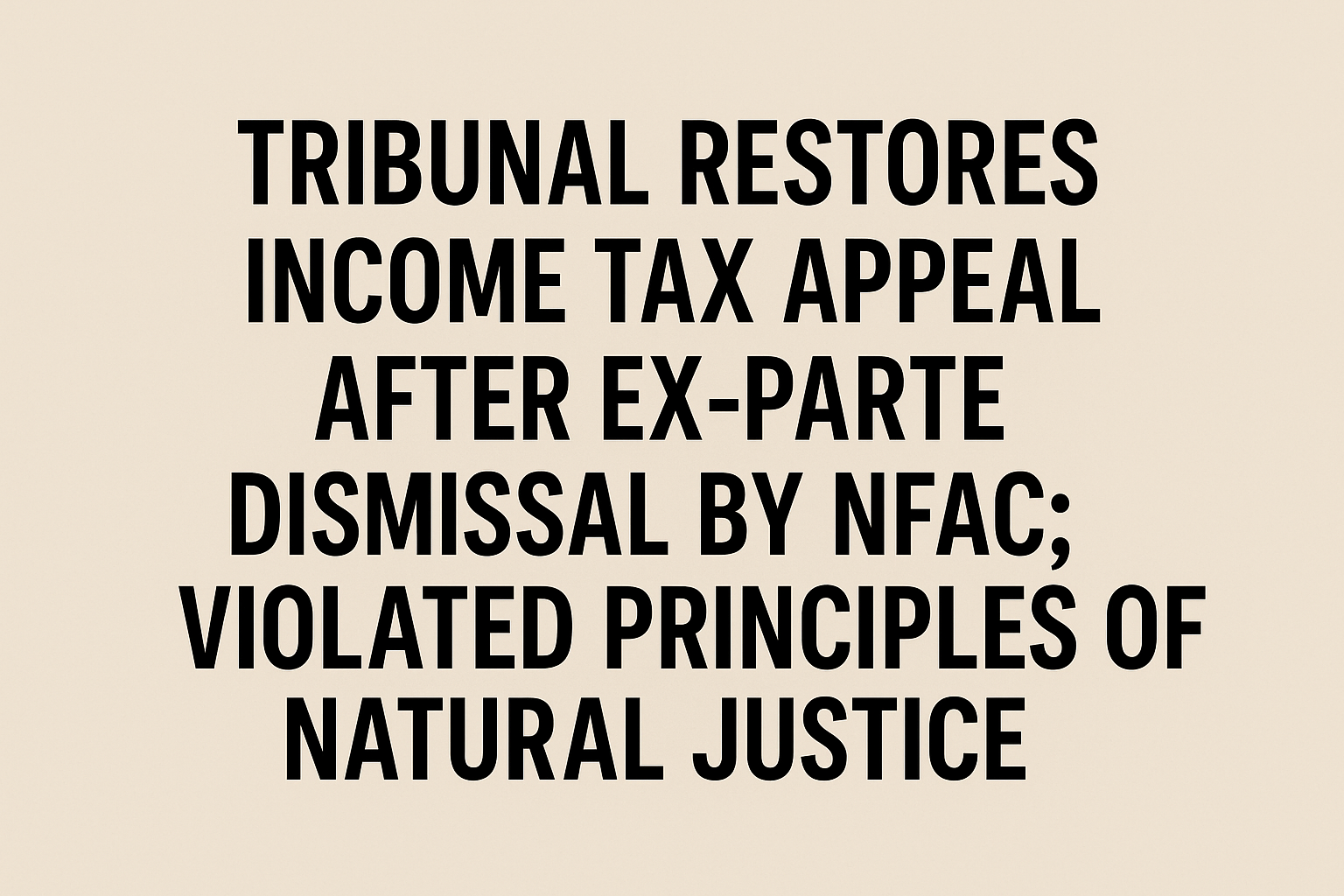
Introduction
In a recent judgment, the Income Tax Appellate Tribunal (ITAT), Ahmedabad bench, restored an appeal filed by an assessee involved in the manufacturing and sale of ceramic glazed tiles. The case sheds light on procedural irregularities, especially in faceless appeal proceedings, and reinforces the importance of natural justice and fair hearing in tax litigation.
Background of the Case
The assessee had filed its income tax return for the Assessment Year (AY) 2016–17, declaring income of ?62.63 lakhs. The return was initially processed under Section 143(1) of the Income Tax Act, 1961. However, the case was later selected for complete scrutiny. The Assessing Officer (AO), without issuing specific show-cause notices, made several additions aggregating to ?16.36 lakhs and assessed the total income at ?79 lakhs.
Breakup of Additions by AO:
Rs 2.72 lakhs under Section 36(1)(va) – delayed PF deposit
Rs 10,100 under Section 43B – disallowed professional tax
Rs 9,640 – disallowed prior period expense
Rs 65,000 under Section 40A(3) – cash payment above threshold
Rs 12.80 lakhs under Section 68 – unexplained cash credit
Appeal Before CIT(A):
The assessee filed an appeal before the Commissioner of Income Tax (Appeals) [CIT(A)], which was subsequently transferred to the National Faceless Appeal Centre (NFAC), Delhi. However, the appeal was dismissed ex-parte due to alleged non-compliance, even though the assessee had filed multiple adjournment requests.
This dismissal was challenged on several grounds, including:
Non-service of valid notices under Sections 143(2) and 142(1)
Additions made without opportunity of hearing
Ignorance of adjournment requests filed via the official portal
Procedural unfairness due to the faceless appeal process
Grounds Raised Before the ITAT
The assessee raised 13 grounds, challenging the legality and correctness of the CIT(A)'s ex-parte order and the underlying assessment order. Key grounds included:
Violation of principles of natural justice
Erroneous disallowances and additions made without evidence or justification
Initiation of penalty proceedings under Section 271(1)(c) without valid basis
Failure to consider available documents like PF and professional tax challans
Demand notices issued without clear computation
Condonation of Delay
The appeal was delayed by 382 days, primarily due to lack of communication from the NFAC, absence of email/postal delivery of the order, and dependency on the Authorized Representative (AR), who failed to inform the assessee. On learning about the order, the assessee acted promptly and filed the appeal.
The ITAT, noting the genuine reasons and in the interest of justice, condoned the delay and admitted the appeal.
Tribunal’s Observations
The ITAT critically examined the procedural lapse:
Violation of Natural Justice:The CIT(A)’s ex-parte dismissal without considering filed adjournment applications was a significant breach of natural justice.
Admissibility of Additional Evidence:The assessee submitted fresh documentary evidence—PF challans, tax payment proofs, loan confirmations—vital for adjudicating disputed additions.
Remand to CIT(A):Recognizing the importance of a fair hearing, the ITAT remanded the case back to the CIT(A) for fresh adjudication with direction to consider the additional evidence and provide proper opportunity to the assessee.
Income Tax Case Law Airona Tiles Limited Versus The DCIT Circle
Citation-2025 TAXONATION 631 (ITAT-AHMEDABAD)
SUBSCRIBE GST E-LIBRARY (INDIA'S HIGHEST GST CASE LAW DATA)
FOR MORE UPDATE ON GST/ IT JOIN OUR FREE WHATSAPP GROUP BY CLICKING ON THIS LINK https://chat.whatsapp.com/C8VB6F6VH
Comment:
Post An Query
Due Dates
BookMark
Send Email
BookMark
Send Email